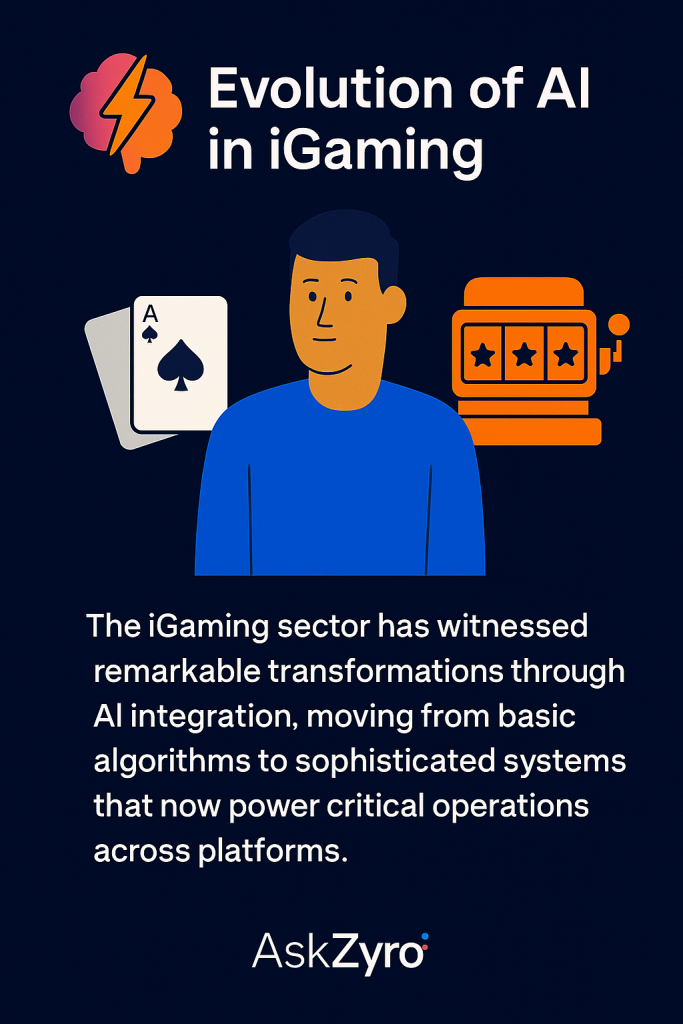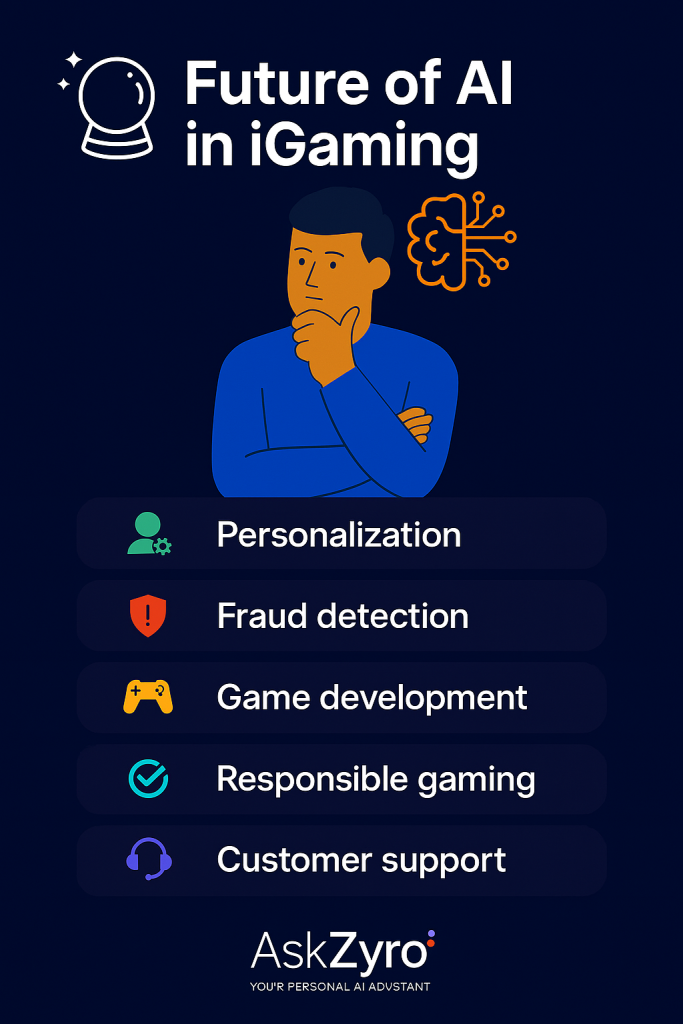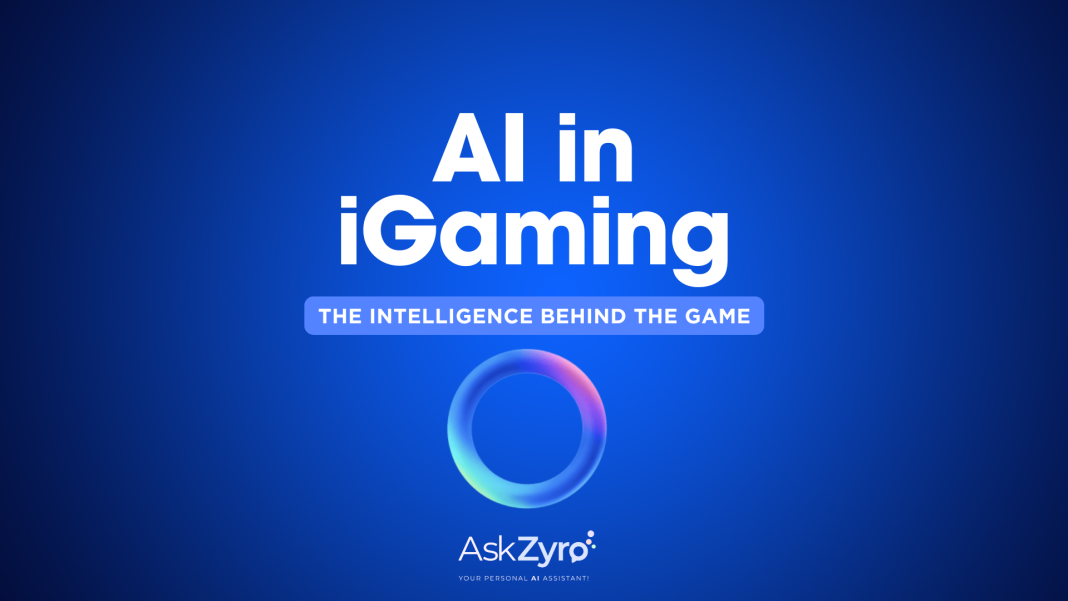Artificial Intelligence is rapidly transforming the iGaming industry, creating both new opportunities and challenges for operators and players alike. AI technologies are revolutionizing how online gaming platforms personalize experiences, detect fraud, and optimize operations while simultaneously addressing critical issues like responsible gambling. From poker bots that analyze game patterns to sophisticated systems that monitor player behavior, the integration of AI into iGaming represents one of the most significant technological shifts in the sector’s history.
The marriage of AI and iGaming isn’t just about improving backend operations—it’s fundamentally changing how players interact with games. AI-powered systems can create more immersive experiences by adjusting difficulty levels based on player skill, recommending personalized content, and even predicting player churn to help operators intervene at the right moment. These technologies are quietly working behind the scenes to make gaming more engaging while simultaneously helping companies optimize marketing campaigns and improve security measures.
Key Takeaways
- AI enhances player experiences through personalization while simultaneously strengthening security and fraud detection systems in iGaming.
- Machine learning algorithms analyze player behavior patterns to improve game design and help operators meet regulatory compliance requirements.
- The future of iGaming will likely feature more immersive experiences through AI combined with augmented reality and other emerging technologies.
Evolution of AI in iGaming
The iGaming sector has witnessed remarkable transformations through AI integration, moving from basic algorithms to sophisticated systems that now power critical operations across platforms.

Historical Development
AI first entered the iGaming industry in the early 2000s with simple pattern recognition capabilities. Early applications focused on basic fraud detection and rudimentary customer segmentation rather than enhancing the gaming experience directly.
By 2010, machine learning algorithms began analyzing player behaviors to identify suspicious betting patterns. These systems were primarily reactive rather than predictive.
The mid-2010s marked a turning point when iGaming operators started implementing more advanced AI tools. Natural language processing enabled better customer service through the first generation of chatbots.
Big data analytics emerged as a crucial component, allowing companies to process vast amounts of player information. This period witnessed the shift from rule-based systems to more adaptive learning models that could improve over time without explicit reprogramming.
Current State of AI Technologies
Today, AI has become a transformative force driving growth and innovation across the iGaming landscape. Modern platforms employ sophisticated machine learning models that personalize every aspect of the player journey.
AI-powered systems now handle:
- Real-time risk assessment for responsible gambling
- Personalized game recommendations based on player preferences
- Dynamic odds calculation in sports betting platforms
- Enhanced KYC processes with facial recognition
The iGaming industry increasingly uses AI to streamline regulatory compliance and enforce betting limits automatically. This helps operators meet legal requirements while protecting vulnerable players.
Player experience has been revolutionized through AI-driven personalization that significantly improves engagement. Games now adapt difficulty levels based on player skill, creating more satisfying experiences that keep users returning.
Enhancing Gaming Experience with AI
Artificial intelligence is transforming how players interact with iGaming platforms, creating more engaging and personalized experiences. AI technologies have become essential tools that enhance gameplay while addressing player needs in real-time.
AI-Driven Game Design
AI is revolutionizing game design in the iGaming industry by creating more dynamic and engaging experiences. Game developers now use AI to predict player behavior and preferences, allowing them to design games that adapt to individual playing styles.
Modern AI algorithms analyze patterns in player actions, adjusting difficulty levels automatically to maintain the perfect balance between challenge and enjoyment. This prevents players from becoming frustrated or bored, keeping them engaged longer.
Graphics and animations have also improved dramatically with AI assistance. Machine learning models can generate realistic textures and movements that were previously impossible or too resource-intensive to create manually.
Many iGaming platforms now feature games that learn from collective player data, continuously evolving their design elements based on what proves most engaging. This creates a constantly refreshing experience even with familiar games.
Personalized Player Support
AI-powered support systems have transformed customer service in iGaming. Studies show AI-driven experiences can increase player retention by 30% by providing immediate, personalized assistance.
AI chatbots now handle complex queries about account information, game rules, and payment issues without human intervention. These systems operate 24/7, eliminating wait times and frustration.
The most advanced support systems can detect emotional cues in player messages, adjusting their tone and responses accordingly. When a player seems upset, the system may offer special bonuses or escalate to human support.
Personalization extends beyond problem-solving. AI analyzes player preferences to recommend new games likely to appeal to them, suggest optimal betting strategies, and create custom rewards programs that match individual playing patterns.
These systems also play a crucial role in responsible gaming initiatives, identifying potential problem gambling behaviors and proactively offering resources and support.
Immersive Gaming with VR and AR
Virtual Reality (VR) and Augmented Reality (AR) technologies, enhanced by AI, are creating unprecedented immersive experiences in iGaming. Players can now enter virtual casinos that feel remarkably similar to physical venues.
AI algorithms power realistic dealer behaviors in VR environments, creating natural interactions that respond intelligently to player actions and decisions. These virtual dealers can maintain conversations and react appropriately to game situations.
AI provides tools to create engaging player experiences by generating dynamic environments that change based on game progress or player preferences. Virtual slot machines might transform their themes or casino floors might rearrange to highlight games the player might enjoy.
AR applications bring gaming elements into the player’s physical environment through mobile devices. Players can place virtual bet tables on their coffee tables or interact with game characters that appear in their living rooms.
Motion tracking and spatial awareness powered by AI ensure these experiences respond naturally to player movements, creating a seamless blend between digital and physical worlds.
Security and Fraud Prevention
In the digital world of iGaming, security remains a top priority. Advanced AI systems now form the backbone of fraud prevention and risk management strategies, helping operators maintain platform integrity while protecting players.
AI in Risk Management and Fraud Detection
AI-powered systems excel at identifying suspicious patterns that human analysts might miss. These systems analyze thousands of data points in real time, flagging potentially fraudulent transactions before they complete. Machine learning algorithms constantly improve by learning from new fraud techniques.
Modern fraud detection AI can monitor player behavior for inconsistencies that might indicate account takeovers or bonus abuse. For example, sudden changes in betting patterns, unusual login locations, or suspicious withdrawal requests trigger automatic alerts.
Many platforms employ neural networks that enhance user experience while preventing fraud. These sophisticated systems create player behavior profiles and flag deviations from established patterns.
Key fraud indicators that AI systems monitor:
- Unusual login times or locations
- Multiple accounts from same IP address
- Suspicious deposit/withdrawal patterns
- Abnormal betting behaviors
- Device fingerprinting inconsistencies
Combating Money Laundering
Money laundering represents a significant threat to iGaming integrity. AI solutions provide powerful tools for Anti-Money Laundering (AML) compliance by monitoring transaction patterns across thousands of accounts simultaneously.
AI-driven AML tools automatically conduct Know Your Customer (KYC) checks, verifying player identities and flagging suspicious activities. These systems can identify structured transactions designed to stay below reporting thresholds.
Advanced algorithms detect complex money laundering techniques like chip dumping in poker or deliberate losses to specific players. The systems analyze relationships between accounts to identify potential collusion rings or money movement patterns.
AI tools also help with regulatory reporting requirements, automatically generating Suspicious Activity Reports (SARs) when certain criteria are met. This automation ensures compliance while reducing operational burdens.
Maintaining Integrity with Human Oversight
Despite AI’s power, human oversight remains essential. Security experts work alongside AI systems to investigate flagged activities, make final determinations, and continuously improve detection algorithms.
Human analysts provide critical context that machines might miss, such as understanding regional differences in playing habits or recognizing legitimate explanations for unusual patterns. This hybrid approach combines AI efficiency with human judgment.
Security teams also conduct regular system audits to verify AI accuracy and eliminate potential biases. As deepfakes and sophisticated scams evolve, human experts must ensure detection systems keep pace.
Regular training for security personnel ensures they understand both the capabilities and limitations of their AI tools. This balanced approach creates a robust security framework that protects players while maintaining game integrity.
AI Applications in Online Gaming
Artificial intelligence has transformed the iGaming industry by enhancing user experiences and providing more personalized gaming options. AI technologies now power various aspects of online gaming from casino platforms to sports betting and lottery systems.
AI in Casino Games
AI technology has revolutionized how online casinos operate and interact with players. Personalized promotions and bonuses are now tailored to individual players based on their gaming preferences and behaviors.
Modern casino platforms utilize AI to create more realistic gaming environments. Virtual dealers powered by AI provide interactive experiences that closely mimic real-world casinos. These systems can adjust difficulty levels based on player skill, keeping games challenging but enjoyable.
AI also helps detect patterns in player behavior that might indicate problem gambling. These systems can flag concerning activity and trigger responsible gaming interventions when necessary.
Casino games now incorporate adaptive elements that learn from player interactions. This creates more engaging gameplay that evolves based on individual playing styles and preferences, keeping players interested for longer periods.
Smart Sports Betting Systems
AI has dramatically improved sports betting platforms by processing vast amounts of data to generate more accurate odds. These systems analyze team statistics, player performance, weather conditions, and historical outcomes to provide better predictions.
AI-powered tools are now essential for live betting scenarios, where odds must be recalculated instantly based on in-game events. This enables more dynamic betting options that weren’t possible with traditional methods.
Personalization extends to sports betting as well. AI systems track bettor preferences and create custom recommendations for markets and events that align with individual interests.
The technology also enhances user interfaces by presenting the most relevant betting options based on user history. This makes navigation simpler even as betting markets grow increasingly complex.
Lottery and Number Games
Lottery platforms now utilize AI to identify patterns in number selection and game participation. This helps operators optimize game offerings and prize structures based on player preferences.
AI systems make number games more interactive by creating dynamic experiences that adapt to player behavior. These games can adjust difficulty and rewards based on player skill levels and engagement patterns.
Immersive lottery experiences are being developed using AI alongside augmented reality. Players can visualize outcomes and experience more engaging gameplay beyond simple number selection.
Fraud detection in lottery systems has improved significantly with AI. Algorithms can identify suspicious patterns that might indicate manipulation attempts, ensuring fair play for all participants.
Social features in lottery games are enhanced through AI that suggests friends and sets up multiplayer options based on player preferences, creating more engaging community experiences.
Operational Efficiency and Business Insights
AI technologies are transforming iGaming operations by streamlining processes and revealing valuable business insights. These innovations enable companies to make data-driven decisions while significantly reducing manual workloads.
AI for Customer Relationship Management
Modern iGaming businesses are implementing AI-powered chatbots and customer support systems that respond to player inquiries instantly. These systems handle routine questions, allowing human staff to focus on complex issues.
AI algorithms analyze player behavior patterns to identify at-risk customers who may develop gambling problems. This enables proactive intervention before issues escalate.
Personalization engines use machine learning to tailor promotions based on individual playing styles and preferences. Players receive relevant offers that match their interests, improving conversion rates by up to 30%.
Customer retention models predict churn probability and automatically trigger re-engagement campaigns. These systems identify disengaged players and deploy targeted incentives to bring them back to the platform.
Data Analytics for Decision Making
AI-powered analytics tools process massive data volumes to generate actionable insights within minutes. Gaming executives can make informed decisions based on real-time performance metrics rather than relying on intuition.
Predictive models forecast future revenue streams with increasing accuracy. These models analyze historical data alongside external factors like sporting events and marketing campaigns.
Key Business Applications:
- Player value prediction
- Game performance optimization
- Fraud detection systems
- Marketing campaign effectiveness
Real-time analysis enables immediate operational adjustments based on current conditions. For example, if a promotional offer is underperforming, the system flags it for revision without waiting for end-of-month reports.
Machine learning algorithms continuously improve as they process more data, making their predictions increasingly reliable over time.
Future of AI in iGaming
Artificial intelligence is rapidly transforming the iGaming landscape with innovations that will reshape player experiences and business operations. The evolution of AI technologies promises both exciting advancements and important considerations for the industry.

Potential Developments in AI Technology
AI-powered personalization is expected to become more sophisticated, creating truly customized gaming experiences that adapt in real-time to player preferences. Games will likely respond intelligently to individual playing styles, making experiences more engaging and immersive.
Generative AI will enable the creation of dynamic game content that evolves based on player interactions. This technology could produce unlimited variations of games without requiring extensive human design input.
The integration of AI with Augmented Reality (AR) will create immersive experiences that blend digital elements with the physical world. Players might engage with virtual casino environments from their homes with unprecedented realism.
Predictive analytics will become more powerful, allowing operators to:
- Forecast player behaviors with greater accuracy
- Identify potential problem gambling earlier
- Optimize game offerings based on trending preferences
- Personalize marketing with higher conversion rates
Challenges and Ethical Considerations
The iGaming industry faces significant ethical hurdles as AI capabilities expand. Responsible gaming tools powered by AI must balance personalization with player protection, identifying problematic behaviors without infringing on privacy.
Regulatory frameworks will need continuous updating to address AI advancements. Many jurisdictions already struggle to keep pace with existing technology, creating potential compliance challenges for operators implementing cutting-edge AI solutions.
Data security concerns will intensify as AI systems require vast amounts of player information. Companies must implement robust protection measures to prevent breaches while maintaining AI effectiveness.
There’s also the risk of algorithmic bias in AI systems that could unfairly target or exclude certain player demographics. Developers must rigorously test systems to ensure fair treatment across all user groups.
As industry experts note, balancing innovation with responsible implementation will determine whether AI truly enhances or potentially harms the iGaming ecosystem.
Frequently Asked Questions
AI integration in iGaming has transformed player experiences and operational processes. These common questions address key implementation aspects, security concerns, and future developments.
How can artificial intelligence be integrated into online gambling platforms?
AI can be integrated into iGaming platforms through personalization engines that tailor content to individual players. These systems analyze player behavior and preferences to create customized experiences.
Machine learning algorithms can power recommendation systems that suggest games based on past playing patterns. This creates a more engaging environment for users while increasing platform retention.
Backend systems can incorporate AI for fraud detection and risk management, analyzing betting patterns in real-time. This helps identify suspicious activities while ensuring fair play across the platform.
What strategies are implemented with AI to enhance the iGaming experience?
Personalized promotions and bonuses use AI to target players with relevant offers based on their gaming history. This approach increases conversion rates compared to generic marketing.
AI-orchestrated gamification creates dynamic reward systems that adapt to player behavior. These systems keep players engaged through challenges and achievements tailored to their skill level.
Predictive analytics help identify players at risk of churning, allowing operators to intervene. This proactive approach helps maintain player relationships before they decide to leave the platform.
Which artificial intelligence tools and technologies are commonly utilized in iGaming applications?
Natural language processing powers chatbots and customer service tools that provide 24/7 support to players. These systems can handle common questions and issues without human intervention.
Computer vision technology monitors live dealer games and ensures compliance with regulations. This creates a more trustworthy gaming environment for players concerned about fairness.
Machine learning algorithms analyze vast amounts of player data to identify patterns and trends. These insights drive business decisions across marketing, game development, and customer retention strategies.
In what ways does artificial intelligence influence player behavior and security in online casinos?
AI systems can identify problem gambling behaviors through pattern recognition. This enables platforms to implement responsible gaming interventions before issues escalate.
Biometric verification technologies enhance security while streamlining the login process. Features like facial recognition and fingerprint scanning reduce account fraud while improving user experience.
Behavioral analysis tools can detect unusual betting patterns that might indicate fraud. This protects both players and operators from potential financial losses due to cheating or account takeovers.
What advancements in AI are anticipated to impact the iGaming industry in the near future?
Voice-activated gaming interfaces will likely become more prevalent, allowing hands-free play. This technology will make games more accessible and create new interaction methods for players.
Augmented reality integration will create more immersive casino experiences that blend virtual and physical elements. These innovations will bring the excitement of physical casinos into players’ homes.
Advanced predictive models will further personalize gaming experiences based on emotional responses and preferences. This level of customization will create stronger connections between players and platforms.
How does the utilization of AI in iGaming improve overall operational efficiency and customer satisfaction?
AI automates routine tasks like customer verification and payment processing, reducing operational costs. This allows human staff to focus on more complex issues requiring personal attention.
Real-time data analysis helps operators quickly adapt to changing player preferences and market conditions. This agility keeps content fresh and relevant, improving overall player satisfaction.
Customer service chatbots handle basic inquiries instantly, eliminating wait times for common questions. This creates a more satisfying experience for players who need immediate assistance.

